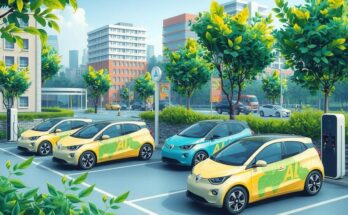Chinese automaker BYD has unveiled five-minute EV fast-charging, challenging Tesla’s standing in the EV market. Audi and Alfa Romeo are re-evaluating their all-electric commitments, while Nissan has secured a battery partnership with SK On. These developments underscore the growing technological disparity between Western and Chinese automakers and raise critical questions about the future of EV adoption.
The landscape of electric vehicles (EVs) is evolving rapidly, particularly in light of recent developments involving BYD, a Chinese automaker that has introduced groundbreaking five-minute fast-charging technology for its EVs. This advancement presents a formidable challenge to Tesla, which has historically been viewed as the leader in this sector. BYD’s introduction of 1,000 kW DC fast charging will allow its new Super e-Platform EVs, priced around $38,000, to add approximately 250 miles of range in just five minutes, potentially alleviating consumer hesitance regarding EV charging times.
In contrast to Tesla’s declining stock, which has been attributed to various factors including public sentiment and the company’s aging model lineup, BYD’s technological innovation prompts investors to question Tesla’s current strategy. While some associate Tesla with the initial EV breakthrough, it appears that China is now leading the charge in electrification technology, raising concerns about the West’s ability to keep pace with these advancements.
Western automakers, such as Audi and Alfa Romeo, are reconsidering their all-electric commitments amidst these challenges. Audi’s leadership has indicated the need for revised timelines regarding its transition to electric vehicles in response to delayed progress in electrification. Alfa Romeo, initially slated to become an electric-only brand by 2027, now plans to retain combustion engines and offer hybrids alongside its electric models. These adjustments suggest a growing apprehension among traditional manufacturers about fully committing to electric transitions.
In a separate but significant development, Nissan has secured a partnership with SK On, a leading battery manufacturer. This agreement will provide nearly 100 GWh of high-performance batteries for Nissan’s upcoming EVs produced at its Mississippi assembly plant. This collaboration not only reinforces Nissan’s dedication to electrification but also signifies a strategic move to enhance American manufacturing while creating jobs.
The implications of ultra-fast charging technology raise important questions regarding the future of EV adoption. Should affordable models with rapid charging become available, consumer interest could significantly shift. The market’s reception of these vehicles, particularly if they originate from China, remains to be seen but could provoke deeper discussions about the competitive nature of the global EV landscape.
In summary, the introduction of advanced fast-charging technology by BYD poses a significant threat to Tesla’s market position, raising concerns about Western automakers’ ability to compete in the rapidly evolving EV sector. Companies like Audi and Alfa Romeo are recalibrating their strategies in light of these developments, while Nissan is forging ahead with new battery partnerships to support its future electrification. The broader implications of ultra-fast charging on consumer adoption could reshape the dynamics of the electric vehicle market.
Original Source: insideevs.com




